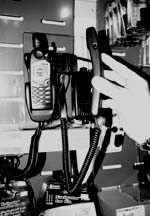|
Friday,
August 24, 2001
Call
waiting
Texas lawmakers say ban on cell phones unlikely
legislation
By Chrissy Braden
senior reporter
New York
passed the United States’ first state law in June to
limit cell phone use while driving, re-igniting debate across
Texas about a possible need for similar laws here.
Although
recent studies have shown the dangers of driving while on
a phone, most Texas lawmakers doubt Texas will ever pass a
law similar to New York’s.
Texas
state Rep. Paul Moreno of El Paso wrote a bill in 1999 that
only allowed drivers to use hands-free phones while driving
or hand-held phones when stopped.
 |
|
Erin
Munger/PHOTO EDITOR
While some legislation focuses on restricting cell phone
use to hands-free sets when driving, studies have shown
the distraction level is no different than talking on
a hand-held.
|
Moreno’s
bill, House Bill 994, which did not pass, was the last bill
proposed in Texas to limit cell phone use while driving. Robert
Grijalva, a staff member in Moreno’s El Paso office,
said the representative concentrated on appropriations in
El Paso this year, rather than limiting cell phone use.
Legislatures
in 42 states have proposed bills this year to restrict or
prohibit cell phone use while driving, according to the National
Conference of State Legislature’s Web site (www.ncsl.org).
Texas did not make such a proposal this year.
Texas
state Rep. Bill Carter said legislation limiting cell phone
use while driving has been discussed the last four or five
years.
“(The
legislation) is an invasion of an area of personal responsibility
and would be ineffective,” Carter said. “It would
be like a law against people putting on lipstick or anything
that keeps both hands from being on the steering wheel.”
The New
York law limits drivers to using a hands-free cell phone.
But a AAA Foundation for Traffic Safety study, that was released
this month, concluded that talking on a cell phone is a greater
distraction than holding the phone.
The study
found that drivers using both hands-free and hand-held cell
phones missed twice as many traffic signals than they did
when they were not on the phone.
Carter said cell phones are rapidly moving to voice-activated
and hands-free technology, making laws restricting cell phone
use to these features unnecessary.
“The
problem isn’t having two hands on the wheel,” Carter
said. “It’s the lack of concentration.”
Verizon
Wireless supports the ban on hand-held cell phones, while
other cell phone companies like Sprint PCS support educating
people on cell phone safety rather than passing legislation
against using cell phones, according to WFAA’s Web site
(www.wfaa.com).
But Carter
said he did not think putting restrictions on drivers’
cell phone use would have a big impact on reducing accidents.
“It’s
more of a feel-good thing,” he said, “It would be
hard to enforce.”
Fort
Worth Police Department Sergeant Harold Baxter agreed a law
against cell phone use while driving would have little impact
on reducing accidents and would be hard to enforce.
“It’d
be like the old open container law,” he said. “We
would have to see someone drinking a beer before it could
be enforced. People would figure out they could still use
their phones, they’d just be careful about doing it when
we were sitting right next to them.”
Baxter
said the FWPD does not record whether or not a cell phone
could have played a role in an accident.
The New
York law was passed after three of the state’s counties
set laws restricting cell phone use while driving to decrease
accidents.
Texas
counties are not subject to make laws, but cities can make
ordinances against things such as driving while using a cell
phone.
Monte
Acers, director of legal services of the Texas Municipal League,
said many cities inquire about such laws.
“I’m
not aware of a city (in Texas) actually doing it,” he
said. “It’s just talk, and it usually stirs up a
lot of debate.”
Although
cities continue to debate restricting cell phone use while
driving, lawmakers like Carter do not think New York’s
law will influence a bill to be passed in Texas when the state
legislature meets again in 2003.
“I
doubt Texas will ever pass a law restricting cell phone use,”
Carter said.
Chrissy Braden
l.c.braden@student.tcu.edu
|
